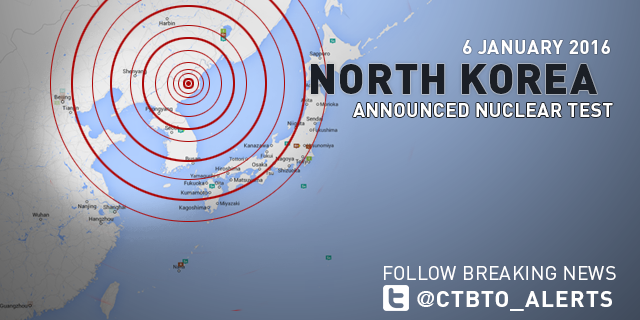The United Nations condemned on January 6 the underground nuclear test announced by the Democratic People’s Republic of Korea (DPRK), with Secretary-General Ban Ki-moon calling it “deeply troubling” and the UN Security Council vowing to immediately begin considering the “significant measures” it had vowed to take in the event of another nuclear test by the country.
Calling the announced incident “a grave contravention of the international norm against nuclear testing,” Ban, addressing reporters at UN Headquarters, added: “This act is profoundly destabilizing for regional security and seriously undermines international non-proliferation efforts. I condemn it unequivocally.”
The UN chief went on to demand that the DPRK cease any further nuclear activities and meet its obligations for verifiable denuclearization.
“We are monitoring and assessing developments in close coordination with the concerned international organisations – including the Comprehensive Nuclear-Test-Ban Treaty Organization (CTBTO) – and interested parties,” concluded the Secretary-General.
The Vienna-based CTBTO, which will be officially established when the Nuclear Test Ban Treaty enters into force, oversees the International Monitoring System (IMS), which, when complete, consist of 337 facilities worldwide to monitor the planet for signs of nuclear explosions.
Immediately following urgent closed-door talks this morning, members of the Security Council strongly condemned this test, which the deemed a clear violation of resolutions 1718 (2006), 1874 (2009), 2087 (2013), and 2094 (2013), and of the non-proliferation regime.
In a statement to the press, the Council’s 15 members also recalled that they have previously expressed determination to take “further significant measures” in the event of another DPRK nuclear test, and in line with this commitment and the gravity of this violation, they said the Council would begin to work immediately on such measures in a new resolution.
Following the announcement on January 6 by the DPRK, the head of the UN International Atomic Energy Agency (IAEA) said that if the nuclear test is confirmed, it is in clear violation of UN Security Council resolutions and is “deeply regrettable.”
“I strongly urge the DPRK to implement fully all relevant resolutions of the UN Security Council and the IAEA,” said Director General Yukiya Amano in a statement.
He added that the IAEA remains ready to contribute to the peaceful resolution of the DPRK nuclear issue “by resuming its nuclear verification activities in the DPRK once a political agreement is reached among countries concerned.”
Meanwhile, the CTBTO has said that its monitoring stations picked up “an unusual seismic event” in the DPRK today at 01:30:00 (UTC), and that its initial location estimate shows that the event took place in the area of the DPRK’s nuclear test site. If confirmed this will be the fourth nuclear test carried out by the country since 2006. CTBTO experts are “analysing the event to establish more about its nature.”
“If confirmed as a nuclear test, this act constitutes a breach of the universally accepted norm against nuclear testing; a norm that has been respected by 183 countries since 1996,” said the Executive Secretary of the Preparatory Commission for the Comprehensive Nuclear-Test-Ban Treaty Organization (CTBTO).
“It is also a grave threat to international peace and security,” he continued. “I urge the DPRK to refrain from further nuclear testing and to join the 183 States Signatories who have signed the Comprehensive Nuclear-Test-Ban Treaty.”
“It’s about time that we be more proactive rather than being reactive to what the North Koreans are doing,” Zerbo underscored in an interview with UN Radio.
In a statement on the CTBTO website, he added: “As we commemorate the 20th anniversary of the opening of the Treaty for signature, it is high time that the global prohibition on nuclear testing is enshrined into a legally binding instrument.
“I sincerely hope that this will serve as the final wake-up call to the international community to outlaw all nuclear testing by bringing the CTBT into force.” said Lassina Zerbo, Executive Secretary of the Preparatory Commission for the Comprehensive Nuclear-Test-Ban Treaty Organization (CTBTO).
Also in a statement today, the President of the General Assembly said he was “dismayed and disappointed” by the news of an underground nuclear test by the DPRK.
“Nuclear weapons and other weapons of mass destruction threaten the existence of humankind and must be eliminated,” said Mogens Lykketoft.
“The Democratic People’s Republic of Korea should abandon its nuclear weapon and missile programmes in a verifiable and irreversible manner, cease all related activities and comply with all its international obligations, including the UN Security Council and IAEA board of governors resolutions as well as other international disarmament and non-proliferation norms.” he added.
He further called on the country to pursue its objectives by “choosing dialogue over demonstrations of power that present a serious threat to global peace and security.”
In a separate statement, Federica Mogherini, the European Union’s High Representative, said on January 6: “The government of the Democratic People’s Republic of Korea (DPRK) has stated that it carried out a nuclear test this morning.
If confirmed, this action would represent a grave violation of the DPRK’s international obligations not to produce or test nuclear weapons, as determined by several United Nations Security Council Resolutions, and a threat to the peace and security of the entire North East Asia region, she added.
“I call on the DPRK to re-engage in a credible and meaningful dialogue with the international community, in particular in the framework of the Six-Party Talks, and to cease this illegal and dangerous behaviour.” (INPS | 6 January 2016)

